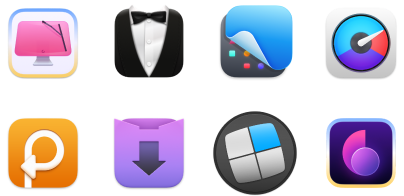What OS can my Mac run? Best compatibility guide
- Check your Mac model before upgrading.
Open the Apple menu and select About This Mac to find your model name and year, then compare it against Apple's official compatibility lists for the macOS version you want. - Not all Macs support the latest macOS versions.
macOS Tahoe (26) only supports Apple silicon Macs and select Intel models from 2019-2020, while macOS Sequoia (15) works with most Macs from 2018 onwards. - Older macOS versions still receive security updates.
If your Mac can't run the newest OS, you can stay on your current version and receive security patches through Software Update for a limited time. - Optimize your Mac's performance instead of upgrading immediately.
Use tools like CleanMyMac to remove junk files, iStat Menus to monitor system performance, and Novabench to benchmark your hardware before deciding on upgrades. - Keep your Mac running smoothly with Setapp.
Access 260+ Mac optimization apps, including CleanMyMac, iStat Menus, and Novabench, with a 7-day free trial to maintain your Mac's performance regardless of which macOS version you're running.
Apple typically introduces a new version of the Mac operating system each year, but not every Mac will be compatible with the latest update. Curious about which macOS versions will work smoothly with your device? This comprehensive macOS compatibility guide will help you identify the versions your Mac can run and which ones are ideal for your hardware.
How to check macOS compatibility with your Mac
Checking if your Mac can handle the latest macOS version is easy. First, find out which model and year your Mac is:
- Click on the Apple icon in the top left corner of your screen.
- Choose About This Mac.
- A window will pop up with all the basic info you need. Note down the model name and year.
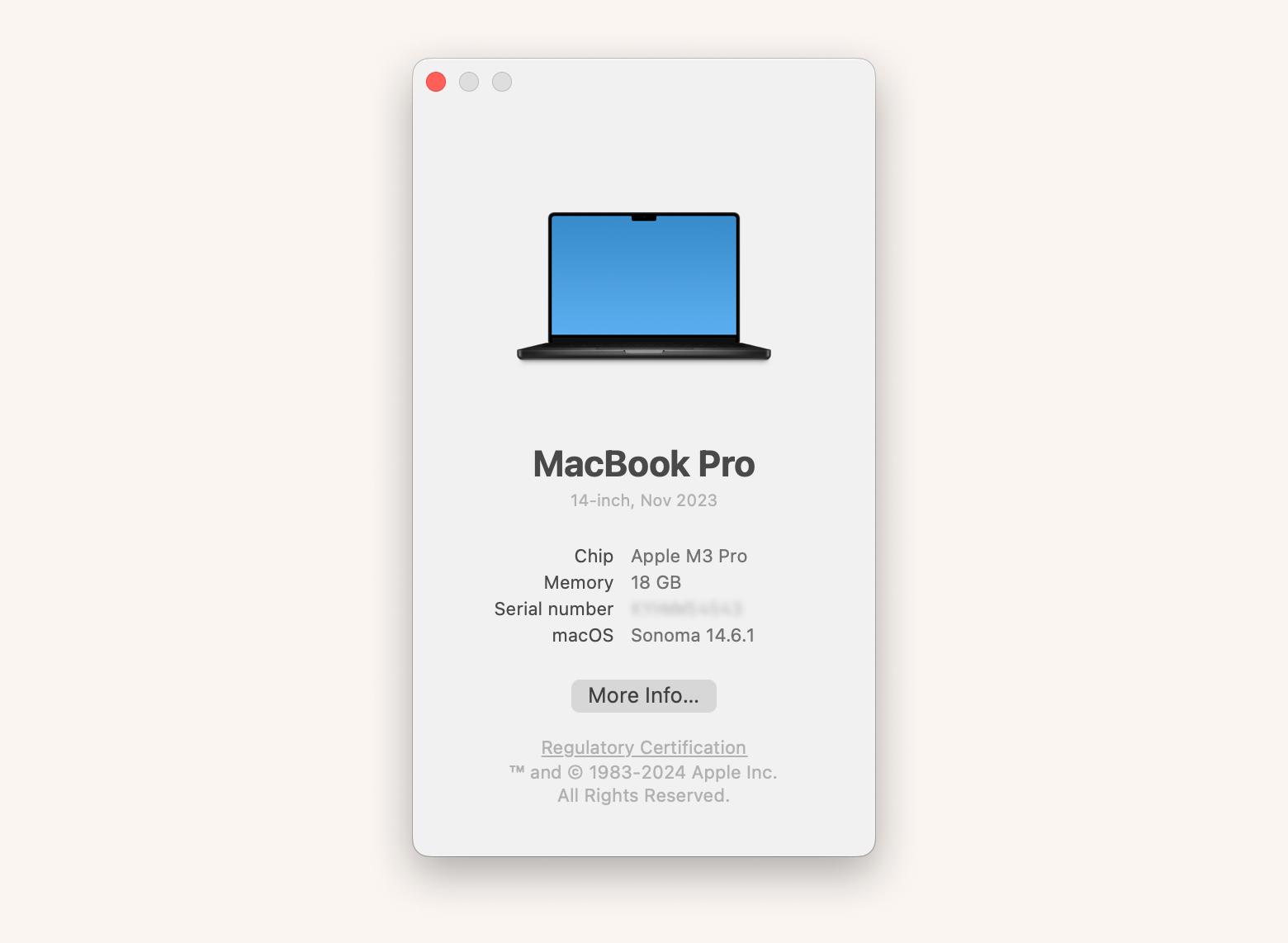
Now, you can compare your Mac with our macOS compatibility checker for the desired macOS version.
macOS compatibility chart (2026 update)
To help you, below is a quick reference chart showing which macOS versions support which Mac models (as of 2026).
Please note that Apple issues a new macOS version nearly every year, and with each release, older models may lose compatibility — so always check before upgrading. Also, check macOS features here to know better about what each version is capable of.
MacBook OS compatibility | Supported Mac models (2026) |
macOS 26 Tahoe | All Apple silicon Macs (M-series), Intel-based Macs: MacBook Pro 16″ (2019), MacBook Pro 13″ (2020), iMac 2020, Mac Pro 2019, Mac mini, and MacBook Air, only for Apple silicon models |
macOS 15 Sequoia | All Apple silicon Macs (M1 and later), Intel-based models that run macOS Sonoma and earlier (e.g., 2018–2019 Intel Macs) |
macOS 14 Sonoma | MacBook (2017 and later), MacBook Air (2018 and later), MacBook Pro (2018 and later), Mac mini (2018 and later), iMac (2019 and later), iMac Pro (all models), Mac Pro (2019 and later), Mac Studio (all models) |
macOS 13 Ventura | MacBook (2017+), MacBook Air (2018+), MacBook Pro (2017+), Mac mini (2018+), iMac (2017+), iMac Pro (all), Mac Pro (2019+), Mac Studio (all models) |
macOS 12 Monterey | MacBook (2016+, MacBook Air (2015+), MacBook Pro (2015+), Mac mini (2014+), iMac (2015+), iMac Pro (2017+), Mac Pro (2013+), Mac Studio |
macOS 11 Big Sur | MacBook (2015+), MacBook Air (2013+), MacBook Pro (2013+), Mac mini (2014+), iMac (2014+), iMac Pro (all), Mac Pro (2013+) |
macOS 10.15 Catalina | MacBook (2015–2017), MacBook Air (2012–2019), MacBook Pro (2012–2019), Mac mini (2012–2018), iMac (2012–2019), iMac Pro (all), Mac Pro (2013) |
Before upgrading to a new macOS: When I was planning to upgrade to the latest macOS, I used the Mac Serial Number Lookup GPT assistant to check my Mac's model year first. This Mac serial number lookup tool helped me confirm whether my hardware could actually run the OS version I wanted before starting the download.
macOS Tahoe compatibility
Released September 15, 2025. The following Macs are compatible with Tahoe:
MacBook Air (with Apple Silicon, 2020 and later)
MacBook Pro (with Apple Silicon, 2020 and later)
MacBook Pro (16-inch, 2019)
MacBook Pro (13-inch, 2020, with Four Thunderbolt 3 ports)
iMac (2020 and later)
Mac mini (2020 and later)
Mac Studio (2022 and later)
Mac Pro (2019 and later)
Note: Tahoe, the latest macOS version, supports Intel-based Macs. Also, Apple Intelligence and other AI features in macOS 26 will only be supported on Apple silicon Macs (M-series).
macOS 15 Sequoia compatibility
Released September 16, 2024. The following Macs are compatible with Sequoia:
- iMac (2019 and later)
- iMac Pro (2017)
- MacBook Air (2020 and later)
- MacBook Pro (2018 and later)
- Mac Mini (2018 and later)
- Mac Pro (2019 and later)
- Mac Studio (all models)
NoteThe Apple Intelligence features included in macOS 15.1 will only be available on Apple Silicon Macs, which are:
|
For more info about macOS Sequoia, read macOS Sequoia features: Everything you need to know.
macOS 14 Sonoma compatibility
Released September 26, 2023. The following Macs are compatible with Sonoma:
- MacBook (2017 and later)
- MacBook Air (2018 and later)
- MacBook Pro (2018 and later)
- Mac Mini (2018 and later)
- iMac (2019 and later)
- iMac Pro (all models)
- Mac Pro (2019 and later)
- Mac Studio (all models)
What macOS can I upgrade to? Maybe it's Sonoma? Check out the best macOS 14 Sonoma features.
macOS 13 Ventura compatibility
Released October 24, 2022. The following Macs are compatible with Ventura:
- MacBook (2017 and later)
- MacBook Air (2018 and later)
- MacBook Pro (2017 and later)
- Mac Mini (2018 and later)
- iMac (2017 and later)
- iMac Pro (all models)
- Mac Pro (2019 and later)
- Mac Studio (all models)
Check out how to install macOS Ventura.
macOS 12 Monterey compatibility
Released October 15, 2021. The following Macs are compatible with Monterey:
- MacBook (2016 and later)
- MacBook Air (2015 and later)
- MacBook Pro (2015 and later)
- Mac Mini (2014 and later)
- iMac (2015 and later)
- iMac Pro (2017 and later)
- Mac Pro (2013 and later)
- Mac Studio
Read more about macOS Monterey features.
macOS 11 Big Sur compatibility
Released November 12, 2020. The following Macs are compatible with Big Sur:
- MacBook (2015 and later)
- MacBook Air (2013 and later)
- MacBook Pro (2013 and later)
- Mac Mini (2014 and later)
- iMac (2014 and later)
- iMac Pro (all models)
- Mac Pro (2013 and later)
You may also like: How to speed up a slow Mac: 17 proven methods.
macOS 10.15 Catalina compatibility
Released October 7, 2019. The following Macs are compatible with Catalina:
- MacBook (2015 to 2017)
- MacBook Air (2012 to 2019)
- MacBook Pro (2012 to 2019)
- Mac Mini (2012 to 2018)
- iMac (2012 to 2019)
- iMac Pro (all models)
- Mac Pro (2013)
Where are you?Fun fact: The MacBook Pro is the most popular device among macOS users in most markets. However, in Italy, Canada, and Australia, the MacBook Air is just as popular. Source: 2024 MacPaw and Setapp Mac Market Estimation |
macOS 10.14 Mojave compatibility
Released September 24, 2018. The following Macs are compatible with Mojave:
- MacBook (2015 to 2017)
- MacBook Air (2012 to 2017)
- MacBook Pro (2012 to 2018)
- Mac Mini (2012 to 2018)
- iMac (2012 to 2017)
- iMac Pro (all models)
- Mac Pro (2013, 2010 with Metal GPU)
macOS 10.13 High Sierra compatibility
Released September 25, 2017. The following Macs are compatible with High Sierra:
- MacBook (2009 to 2017)
- MacBook Air (2010 to 2017)
- MacBook Pro (2010 to 2017)
- Mac Mini (2010 to 2014)
- iMac (2009 to 2017)
- Mac Pro (2010 and 2013)
macOS 10.12 Sierra compatibility
Released September 20, 2016. The following Macs are compatible with Sierra:
- MacBook (2009 to 2017)
- MacBook Air (2010 to 2017)
- MacBook Pro (2010 to 2015)
- Mac Mini (2010 to 2014)
- iMac (2009 to 2015)
- Mac Pro (2010 and 2013)
macOS 10.11 El Capitan compatibility
Released September 30, 2015. The following Macs are compatible with El Capitan:
- MacBook (2008 to 2017)
- MacBook Air (2008 to 2015)
- MacBook Pro (2007 to 2015)
- Mac Mini (2009 to 2014)
- iMac (2007 to 2015)
- Mac Pro (2008, 2010, 2013)
macOS 10.10 Yosemite compatibility
Released October 16, 2014. The following Macs are compatible with Yosemite:
- MacBook (2008 to 2010)
- MacBook Air (2008 to 2013)
- MacBook Pro (2009 to 2014)
- Mac Mini (2009 to 2012)
- iMac (2007 to 2014)
- Mac Pro (2008 and 2010)
macOS 10.9 Mavericks compatibility
Released October 22, 2013. The following Macs are compatible with Mavericks:
- MacBook (2008 to 2010)
- MacBook Air (2008 to 2013)
- MacBook Pro (2007 to 2013)
- Mac Mini (2009 to 2012)
- iMac (2007 to 2013)
- Mac Pro (2008 and 2010)
macOS 10.8 Mountain Lion compatibility
Released July 25, 2012. The following Macs are compatible with Mountain Lion:
- MacBook (2008 to 2010)
- MacBook Air (2008 to 2012)
- MacBook Pro (2007 to 2012)
- Mac Mini (2009 to 2011)
- iMac (2007 to 2011)
- Mac Pro (2008 and 2010)
What to do if your Mac is incompatible with new macOS versions
So you've checked Mac operating system compatibility and found that your device can't run the macOS you want. What to do? If you own an older Mac, this doesn't mean you're out of options. There are several ways to keep your device secure and running efficiently, even if you find it incompatible with the latest macOS versions.
Option 1: Use the current macOS with security patches
Even if your Mac can't run the newest OS, there is good news for you. Apple typically provides security updates for older versions. Here's how to check for them:
- Go to the Apple menu and open System Settings.
- Click on General > Software Update. This will check for any available updates for your current macOS version, including important security patches.
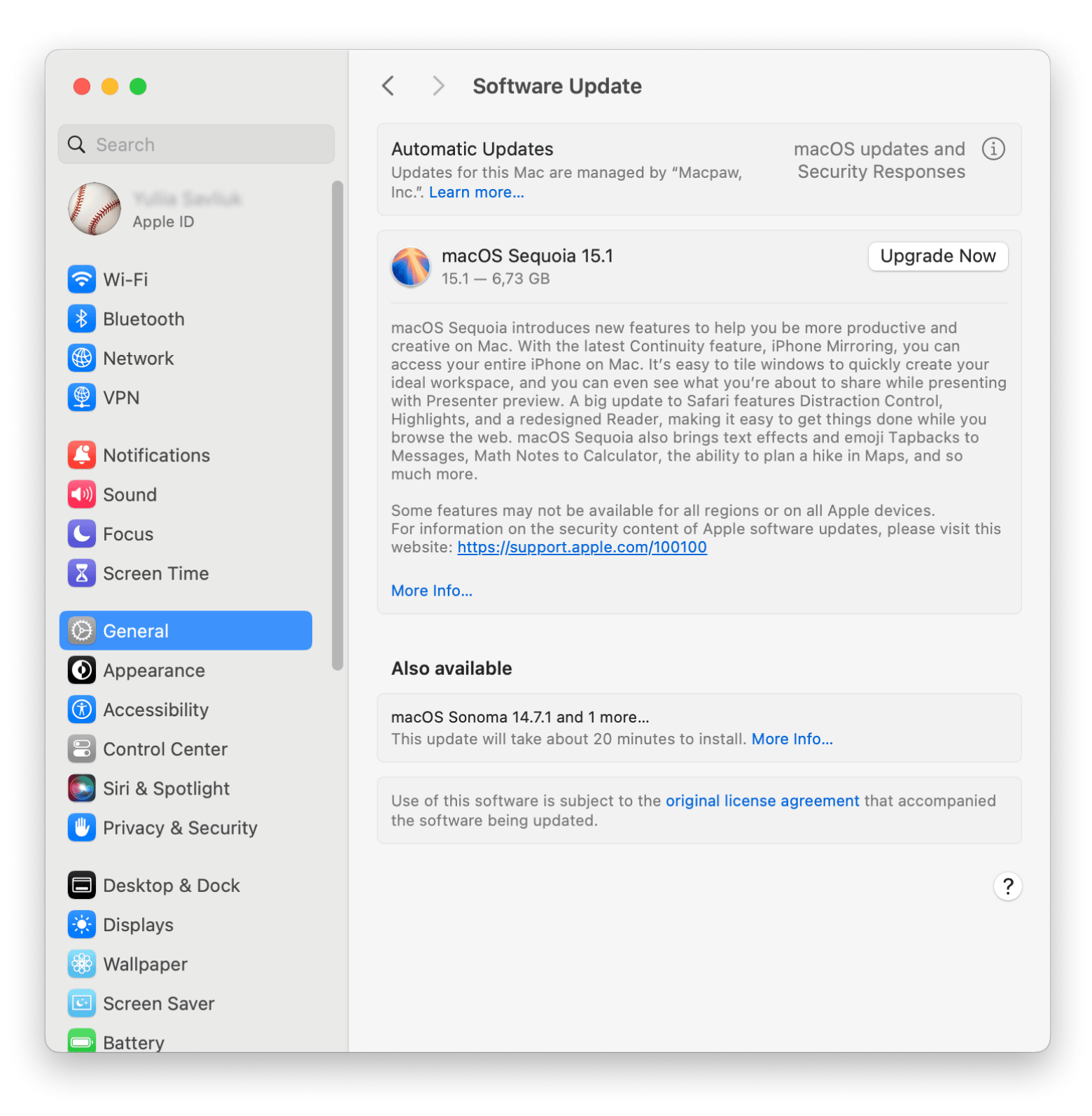
Option 2: Optimize performance
Over time, your Mac will gather unnecessary files and slow down. This is a common problem. So don't worry. Fortunately, with the right tools, you can make things much better.
Start with CleanMyMac. I use this app to remove junk files, unwanted apps, and other clutter that can slow down my system. The best part? It can clean up your Mac with just a few clicks! The result? You'll get much valuable storage, increased speed, and enhanced overall performance.
Here's how to speed up your Mac using CleanMyMac:
- Install and open CleanMyMac.
- Click Cleanup in the side menu.
- Click Scan > Review All Junk.
- Review System Junk and select files you want to remove > Clean Up.
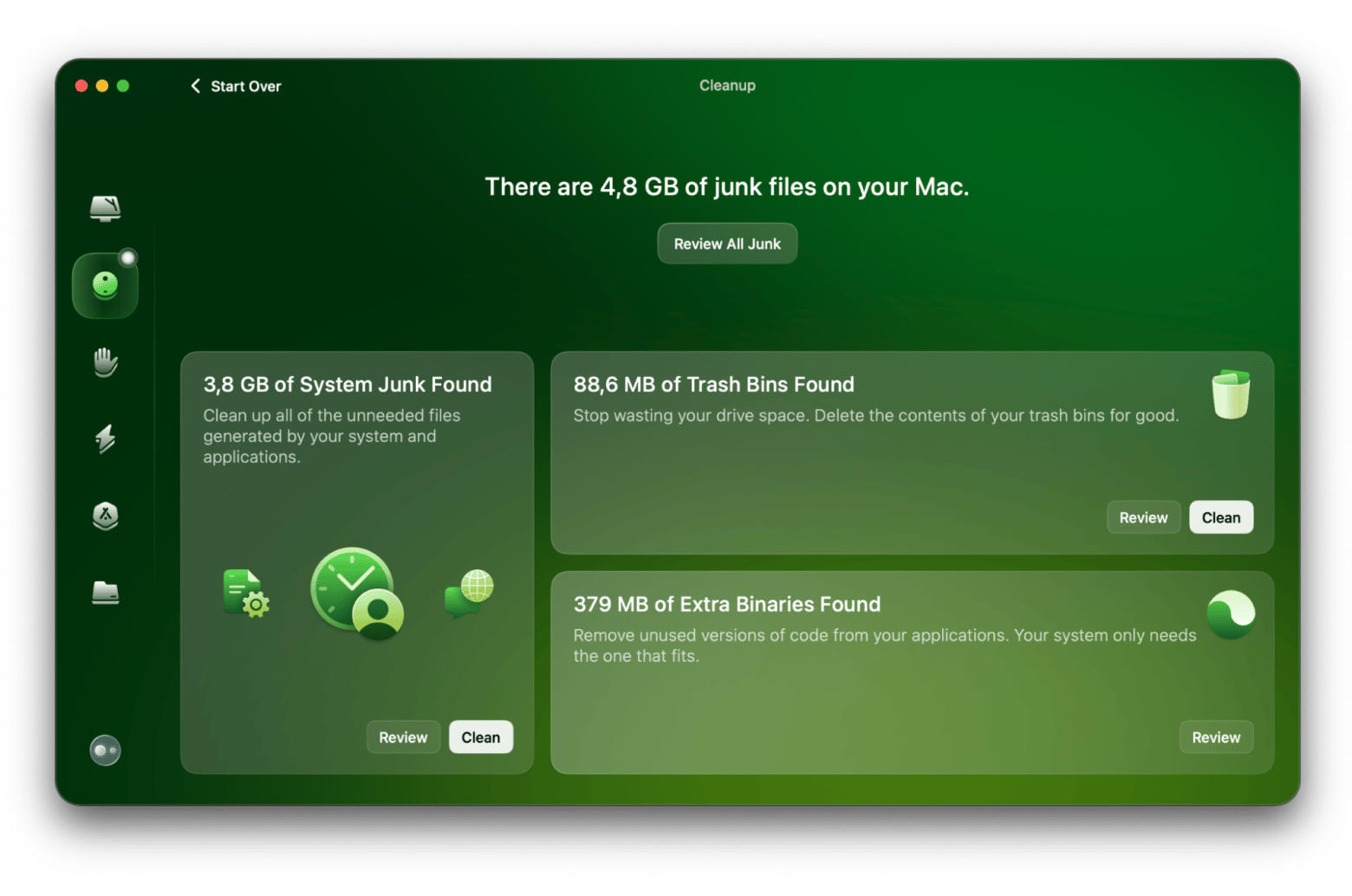
Additionally, I recommend you try iStat Menus to keep track of your Mac's performance. This tool offers detailed insights into your computer's operations, showing important statistics right from your menu bar. You can monitor CPU usage, temperature, battery life, and more.
![]()
The best part? iStat Menus will notify you of any potential issues before they escalate.
Option 3: Consider hardware upgrades
If you want to have the latest macOS features, your only option might be to upgrade your Mac's hardware to meet the new requirements.
You can go and buy a new Mac but before you do this, check out Novabench. It's a benchmarking tool that tests your Mac's performance. It runs a series of tests on your CPU, GPU, RAM, and storage speed, giving you a score that helps you see how your Mac stacks up.
It's super easy to use — just download it, run the tests, and you'll get a detailed breakdown of where you might need improvements. If you're thinking about upgrading your hardware, the results can help you decide what to upgrade.
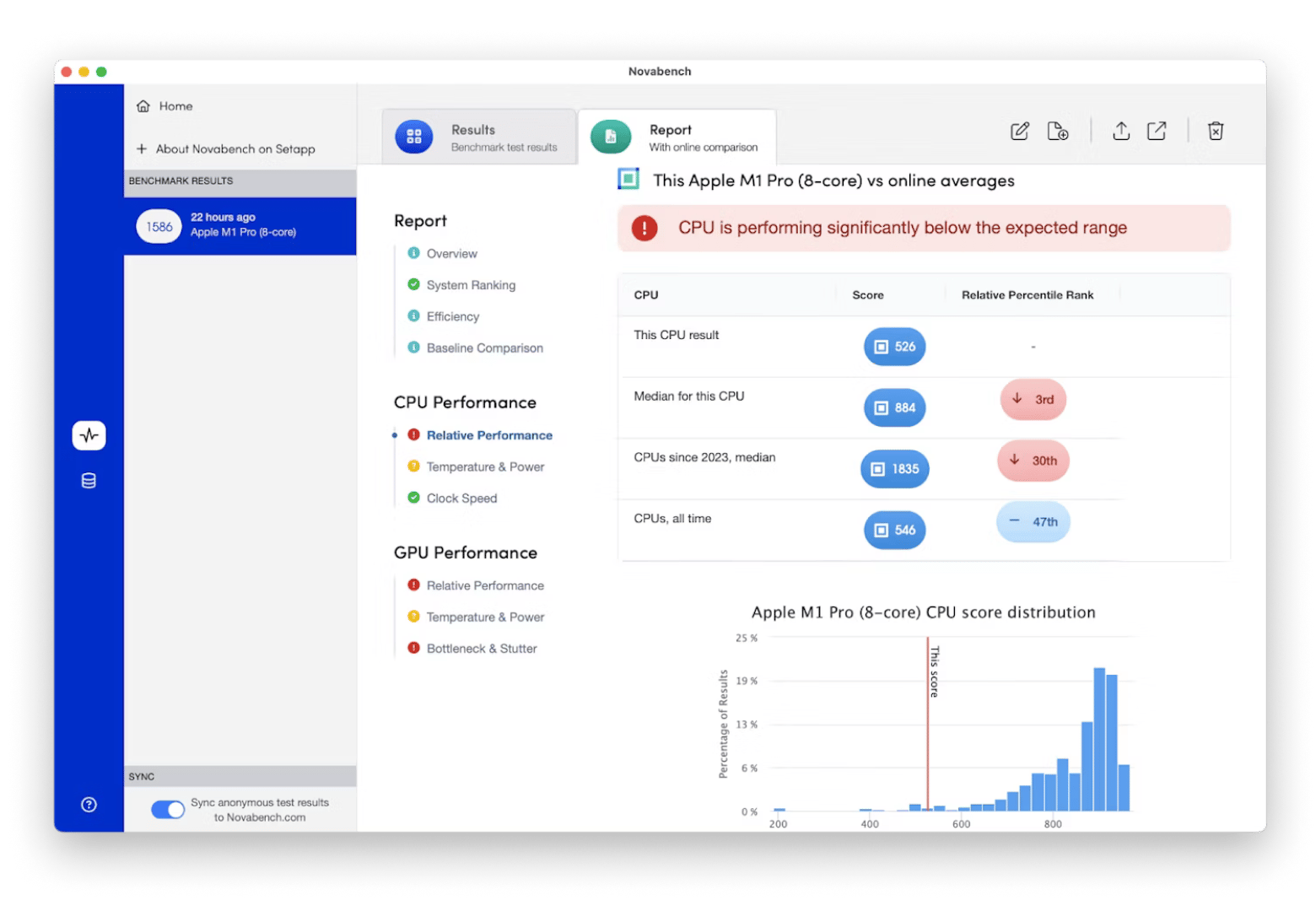
Quick recap: What to do if your Mac can't run the macOS you want
So here you have it – the macOS compatibility chart. But what if you're frustrated that your Mac can't run the system you want? Here's a quick rundown of what you can do:
- Declutter your Mac to speed it up using CleanMyMac.
- Track your Mac performance and get notified by iStat Menus of any potential issues before they escalate.
- Benchmark your Mac with Novabench to see what exactly you might need to upgrade.
You can find these three apps on the Setapp platform, along with 260+ others. They'll make keeping your Mac in shape a whole lot easier and also handle almost any task you can imagine. Why not give Setapp a try? All apps are free to test for 7 days.
FAQ
How do I check macOS compatibility with my Mac?
Open the Apple menu > About This Mac to see your current model and macOS version. Then compare your model against Apple's published compatibility lists for each OS version (e.g., Sequoia, Sonoma, Tahoe). If your Mac appears in the list for that version, it's officially supported.
Which Macs have macOS Sequoia compatibility?
macOS Sequoia (15) supports a range of recent Macs, including Apple silicon models and many newer Intel Macs: MacBook Air (2020 and later), MacBook Pro (2018 and later), iMac (2019 and later), iMac Pro (2017), Mac mini (2018 and later), Mac Studio (2022 and later), Mac Pro (2019 and later).
Is my MacBook compatible with macOS Sonoma?
If your MacBook model is from 2018 or later, it's likely compatible with macOS Sonoma (14). Apple's official list includes MacBook Air (2018+), MacBook Pro (2018+), and other recent Macs. To confirm, check "About This Mac" and compare your model to Apple's Sonoma compatibility list.
What happens if my Mac is not compatible with the latest macOS?
If your Mac isn't officially supported by the latest macOS, you won't see that update in Software Update, and you can't install it normally. You can continue using your current version, but you'll miss new features and eventually stop receiving security updates for older macOS versions.
Is it safe to keep using an older macOS version for compatibility reasons?
Yes. Older macOS versions continue working, and many apps still support them, but security updates and bug fixes eventually stop. Staying on an older OS can be fine short‑term, but upgrading when possible helps keep your Mac secure and compatible with apps and services.
Where can I find a full macOS compatibility chart for 2026?
Apple publishes official compatibility lists on its Support website for each macOS release.

